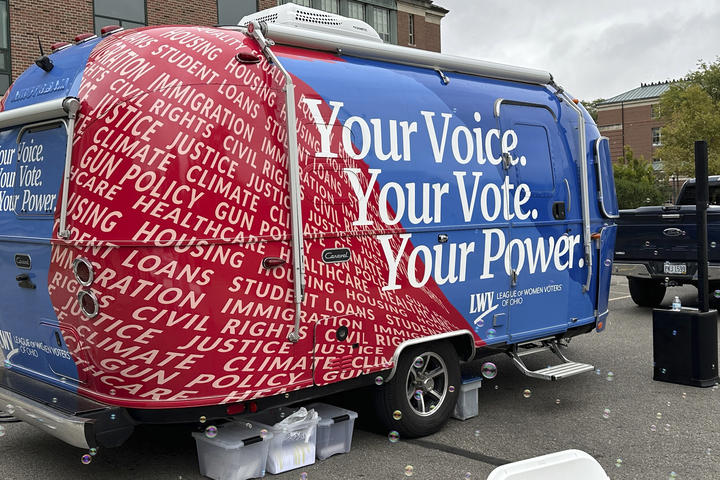This message is directed to you, the young voter who has no idea what they want when it comes to politics.
You are fatalistic, meaning you believe all events are predetermined and therefore are inevitable. Because of that, political theatrics disguise this election’s two presidential candidates as some twisted forms of good and evil.
Both choices leave you feeling unsafe, yet we’re told they are the only paths forward.
So you give up. You stop listening to the news and avoid political confrontation. Feelings are unengaged, scared, trapped in something you can’t comprehend because you are too sensitive.
What happens in turn?
You oversimplify complex issues into two opposing sides. Extreme polarization is followed with a sprinkle of nuanced understanding of the world around you. In the end, you’re burnt out, and you are never happy.
Americans are becoming highly emotionally polarized – meaning they’re harboring negative emotions toward other political parties. Likewise, that increasing polarization may be contributing in part to an increase in political violence, according to the Carnegie Endowment for International Peace.
But it’s OK – I have a solution.
Don’t vote on the character of our president.
I am talking about not voting for an indecisive, inauthentic Kamala Harris who’s too opportunistic. But also don’t vote for an impulsive and narcissistic Donald Trump.
Vote for policies.
Participating in our democracy because it’s your civic duty is one thing, knowing what you are voting for is another. Young voters need to think long term.
To break free from this trap of political confusion, we need to vote for policies rather than the personal character of candidates. Every ticket on the ballot, whether blue, red or green, will have policies and representatives that align with your values to some extent.
For us, understanding specific policies from both parties this election year is crucial.
The Democratic Party focuses on tackling the climate crisis and securing energy independence, growing the economy from the middle out and bottom up, expanding access to affordable healthcare, and implementing stricter gun control measures.
On the other hand, the Republican Party emphasizes increasing border control, deregulating industries, lowering taxes and increasing America’s dominance as an energy producer.
The next step is to understand yourself. Maybe write a pros and cons list of each policy or idea. Consider yourself, others and the rest of the country when making decisions. Find meaning behind it all, and be the bigger person when it comes to debate and narrative rhetoric.
The Lord knows we all need to be more susceptible to being more open-minded.
It’s crucial to understand your beliefs on issues like the economy, immigration and healthcare, and to vote based on those policies.
Donald Howard, a third-year law student at NIU, emphasized this point.
“As a society, we devolve into this idea of dichotomy, that everything’s black and white,” Howard said. “You’re either for this person or you’re for that person. And there’s no in-between. There were a lot of things that the former President (Donald) Trump did that people didn’t agree with. I just would highly stress to people that along the lines of party-based voting, while it’s OK to champion certain political heads or build behind their rhetoric or narrative, it’s more important to look at what they want to do in office.”
Howard recognizes the pervasive issues of binary politics that Generation Z voters may face. In context, Gen Z seems to feel compelled to choose sides without considering the nuances.
Abby Rippeon, a second-year law student, emphasized the importance of being informed about current policies and their effects before voting.
“If you want to vote for someone that’s going to have a better policy, you have to know what the policies are actually doing right now,” Rippeon said. “A lot of people don’t realize that policies take a long time to put into effect. So they should vote for someone that’s going to be able to change them and not just keep the same policies.”
Long term impacts and future goals are important when considering who to vote for as well.
Beesan Salama, currently pursuing a law degree and a MBA, believes in the importance of voting. However, her deep understanding of her identity as a Palestinian leads her to protest the election because of the Israel-Hamas war.
“I just don’t feel comfortable voting for either party, that’s just my stance with the current genocide going on, but I wouldn’t encourage somebody to not vote,” Salama said. “I would just encourage somebody to… vote for the lesser evil. But just for me, personally, they’re both genocide. Enabling a genocide just makes you the purest form of evil. So for me, there is no lesser evil.”
She has a clear sense of self and makes decisions rooted in her beliefs. Many of us have not done that.
So, let’s start. Begin by breaking free from the political theater and gaining a deeper understanding of yourself. This will help you make informed decisions that transcend the simplistic concept of good versus evil.
It’s about believing in policies that an administration might advocate for that addresses the issues we care about, shaping our future and that of the next generation.
In the end, we want to get involved, no longer scared or oppressed by political confusion. Together, we face our fears in the pursuit of happiness.














